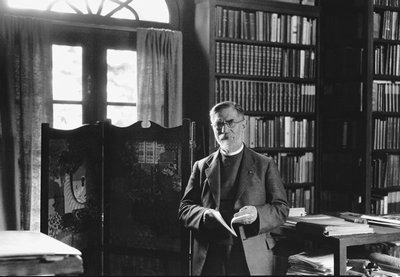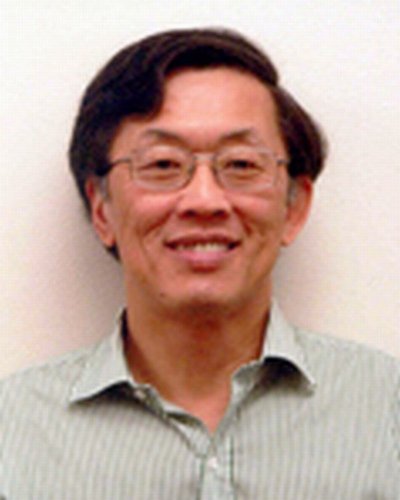October 23, 2008
Centennial Lecture Series kicks off with lecture by Anand Yang
The Henry M. Jackson School of International Studies is beginning its 100th birthday this fall — a yearlong celebration that kicks off with a lecture by the school’s director on Oct. 29 and culminates with a centennial gala at the Fairmont Olympic Hotel in Seattle in May of 2009.
Actually, it’s only been the Jackson School for a quarter century, since the UW Regents approved a name change to honor popular longtime Washington Democrat Sen. Henry M. Jackson in 1983. But the school — together with the departments of Near Eastern Languages and Civilization, Scandinavian Studies and Asian Languages and Literature — traces its beginnings way back to the days of the great Alaska-Yukon-Pacific Exposition held on campus in 1909.
All four units sprang from what started as two UW departments — the Department of Scandinavian Languages and the Department of Oriental History, Languages and Institutions (later named Oriental Subjects) — each at the time boasting a single faculty member. These two departments have since expanded and transformed to become four College of Arts and Sciences departments: Scandinavian Studies, Asian Languages and Literature, Near Eastern Languages and Civilization, and the Jackson School.
The intent of the centennial lecture series is to recognize each of the four departments. The first event spotlights the Jackson School and will be a public lecture by Anand Yang, the school’s director, from 7 to 9 p.m. Oct. 29, in 120 Kane. The lecture will be titled The Rise of Asia: A New World Order?
According to publicity notes, Yang, who also holds the Golub Chair of International Studies, will discuss “the transformations occurring in the region of Asia that have made it the epicenter of the world in the 21st century.” The notes state, “The rise of Asia is perhaps the single most import important story in world history today. Will its rise continue in the coming decades, and what implications does its growing and strategic power have for the rest of the world, especially the United States?”
The series, under the collective heading “The Centennial Series: Beyond the American Point of View,” will continue with three other lectures:
- Nov. 5: Jonathan Brown, assistant professor of Arabic and Islamic Studies, will speak on Islam and Sexuality: Beyond the Headlines.
- Nov. 12: Christine Ingebritsen, professor of Scandinavian Studies, will speak on The Power of Scandinavia.
- Nov. 19: Michael Shapiro, professor and chair of the Department of Asian Languages and Literature, and Zev Handel, an associate professor in the same department, will team up to discuss A Fire Pot of Tongues: Asian Languages in a New Global Environment.
Felicia Hecker, associate director of the Middle East Center School, wrote an excellent, in-depth history of the first 90 years of international studies at the UW. It’s available online at http://jsis.washington.edu/jackson/history.shtml.
The seed that grew into the Jackson School, Hecker wrote, was the original Department of Oriental Subjects, whose creation was announced in May of 1909 by the Rev. Herbert H. Gowen in a speech titled “The Significance of the Orient to the State.” The Regents chose Gowen to head the new department when it was formalized in 1914. He ran the department without staff support and taught most of its courses until 1929.
The name was changed to the Department of Far Eastern Studies in 1940. The department was renamed again in 1949, becoming the Department of Far Eastern and Slavic Languages and Literature, but, as Hecker wrote in her history, “It remained at the heart of the newly formed Far Eastern and Russian Institute,” a relationship that remained in place until 1968.
The late 1960s brought a reorganization, with the UW Regents deciding to divide the growing department into two new ones — the Department of Asian Languages and Literature and the Department of Slavic Languages and Literature. The Far Eastern and Russian institute was left intact then, but in 1971 the growth of international studies on campus led the Regents to rename it the Institute for Comparative and Foreign Area Studies.
The institute became the UW School of International Studies in 1976, and a couple of years later attracted the attention of its current famous namesake. In 1978, then-director Kenneth B. Pyle visited the Washington, D.C., office of Sen. Henry M. Jackson looking for fundraising support. The senator was out but his staff promised he’d follow up. Hecker wrote, “Indeed, a few months later, Senator Jackson visited Pyle in his office in Thomson Hall, and for over two hours they discussed the national need for research and training in international affairs and the role the school should play in this effort. At the end of the conversation, Jackson said, ‘I want to help.'”
Jackson enlisted the support of the CEOs of Boeing and United Airlines, among many others, to establish the first endowment campaign for the school. The senator donated $5,000 as well as the honoraria for his speaking engagements from that time on, up until his death in 1983. The UW Regents approved the most recent name change for the school in September of 1983, making it at last the Henry M. Jackson School of International Studies.
Several events have been planned at the Jackson School to commemorate the anniversary. They include:
- A Washington, D.C., alumni reception at the Cosmos Club on Dupont Circle in December 2008.
- A Jackson School panel discussion, 10 Things the New President Must Know About the World, 6:30 p.m. Wednesday, Jan. 14, 2009, in 110 Kane.
- Jackson School Centennial Lecture, with Mel Leffler, University of Virginia, speaking on U.S. foreign policy on Feb. 27, 2009.
- A reception for the Jackson School at the annual meeting of the Association for Asian Studies on March 28, 2009, in Chicago.
- Jackson School Centennial Open House during Washington Weekend, April 2009.
- A Centennial Gala at the Fairmont Olympic Hotel in Seattle on May 11, 2009.
For more information on the Jackson School of International Studies, its history, events or programs, visit online at www.jsis.washington.edu.




